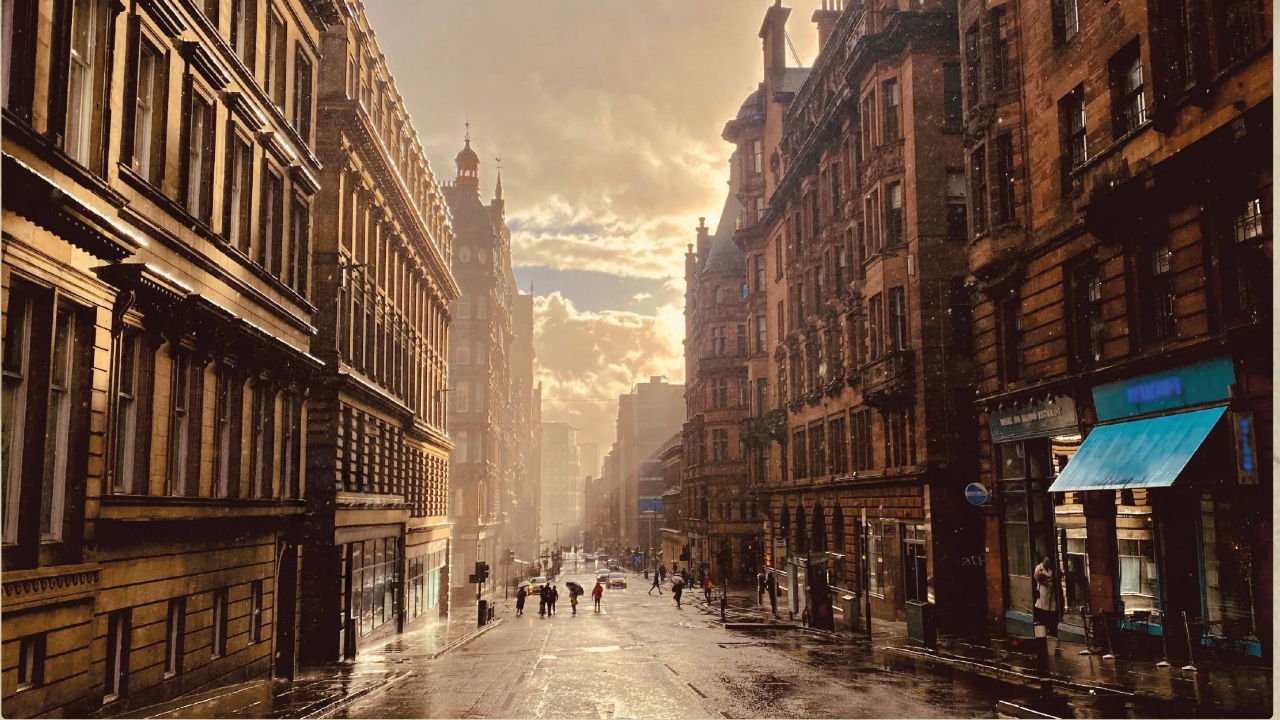You can trust Louder
Even back when they formed in the 80s, The Bathers were one of the strangest bands in Glasgow. Back when your route to market was as either a duffle-coat-wearing post-Postcard indie band or a Caledonian-soul sophisti-pop band (Deacon Blue, Hipsway, Love and Money), Chris Thomson – who had a foot in both camps – chose to go his own way.
Thomson is the head of The Bathers' grand collective – singer, songwriter, and only consistent member – and he’s been swimming against the tide for almost four decades now. Not for cash, not even for acclaim (The Bathers have been roundly ignored by the music media), doggedly pursuing his own grand musical vision while singing like a man with a broken heart and a mouthful of broken teeth.
The Bathers have always been complete outliers. At best, you could say they belong to a strain of Scottish music that was literate, unashamedly smart – pretentious, even – expressive and romantic, which in a tough town like Glasgow is pretty much the most rebellious thing you can be.
The Bathers were not tailor-made for the John Peel show or for the taste-makers of the NME. Their debut album betrayed some of their influences – Isn’t She Shining could have been Young Americans-era Bowie, the guitars shared the clean country-twang of Rattlesnakes-era Commotions – but by their second album, Sweet Deceit, Thomson was in a world of his own.
By Deceit, he seemed to have taken on a persona, like some kind of haunted barroom crooner – Tom Waits without the gags – theatrical, poetic, intense. (The opening lyrics of Sweet Deceit go: “I followed you one night from the Glasgow School of Art/ We took a night train to Paris, France/We took a room, off the Rue Royale…” It was ridiculously romantic and sometimes just ridiculous: I mean, c’mon, that is one smooth-talking stalker.)
By third album, Lagoon Blues, the sound had taken shape: grand songs about doomed love affairs and romantic obsessions, backed by pianos, orchestras and string quartets; a bed of acoustic guitars, the occasional electric as a rare concession to modernity, with angelic female voices adding Morricone-esque beauty and drama.
Direct reference points could be the Bowie of Wild Is The Wind, the Bunnymen at their most grandiose, circa Ocean Rain, maybe Scott Walker or Rickie Lee Jones. The Bathers are where The Blue Nile meet Nick Cave (Thomson: the Nick Cave of Kelvingrove!). On Sweet Deceit, he sang/growled: “Girl, I’m 19 and I’m fuckin’ crazy about you!” But dumb teenage romance has given way to something more profound: middle-aged symphonies, music full of regret, longing and loss.
The latest news, features and interviews direct to your inbox, from the global home of alternative music.
New album Sirenesque has been 20 years in the making and might be his best yet. Apple Music tells me it’s the album I have listened to most this year (168 times, for 802 minutes) but it still feels fresh and unknowable. You could say it’s a bit like Slow Cinema – music that takes its time to reveal itself, music that refuses to hit the obvious beats or rely on formulas – but neither is it truly minimalist.
The songs show a complete disregard for conventional song length (Sirenesque’s tracks range from 55 seconds to 7:43 mins) or for traditional song structure (some have choruses, some don’t – some barely have verses) but all work perfectly. Sirenesque has the feel of a soundtrack album or music from a stage show – you could easily imagine this music soundtracking a dramatic love story on a Glasgow stage.
Decades after Sweet Deceit, Thomson’s voice seems natural, less of a schtick. The songs are still set in very real and specific locations (presumably places that mean something to the women he’s singing them to, although I like to think of them as clues to a series of unsolved murders – it gives it all a Ripley-esque edge).
Sirenesque namechecks Culzean and Port Carrick (in Ayrshire), the Rue Royale in Paris, The Port of Fitzroy in New Zealand, and even finds romance in The Powburn Toll (Uddingston), Glencairn Drive (in Strathbungo/Pollockshields), and the Old Toll Bar on Paisley Rd West. (And finding romance there is quite some feat: I Googled “the Old Toll Bar” to confirm its address and Google auto-completed my search to “Old Toll Bar Glasgow stabbing”.)
Glasgow is Thomson’s muse as much as the women he sings of. Glasgow is to The Bathers what Paterson, New Jersey, was to the poet William Carlos Williams or Albany, New York, to the novelist William Kennedy. He has reimagined Glasgow. In the work of The Bathers, Glasgow is much more than No Mean City – a town of chib-marks, headbutts and sectarian violence – it’s a city of culture, where love affairs play out on old rainswept streets.
It’s all there on the album cover, a Glasgow street scene. The sun is setting behind the tenement buildings, and the street glows orange with the fading light, the blue awning of a storefront reflected in a patch of sky. On first impression, it looks like an old oil painting, something by Jack Vettriano, maybe – a romanticised vision of old Glasgow in the rain. And then you look closer and see the people in their jeans and coats and the very modern cars sitting at the traffic lights and realise: It’s not a painting, it’s a photograph of Glasgow as it is now.
It’s like the sound of The Bathers: old-but-new, universal-but-specific (“—Say it, no ideas but in things—”), eternal and timeless. A world where grand romance and beauty still plays out, and where the music is still big, it’s just the world that got small. Album of the year.
The Bathers' Sirenesque is out now and available to buy or stream.

Scott is the Content Director of Music at Future plc, responsible for the editorial strategy of online and print brands like Louder, Classic Rock, Metal Hammer, Prog, Guitarist, Guitar World, Guitar Player, Total Guitar etc. He was Editor in Chief of Classic Rock magazine for 10 years and Editor of Total Guitar for 4 years and has contributed to The Big Issue, Esquire and more. Scott wrote chapters for two of legendary sleeve designer Storm Thorgerson's books (For The Love Of Vinyl, 2009, and Gathering Storm, 2015). He regularly appears on Classic Rock’s podcast, The 20 Million Club, and was the writer/researcher on 2017’s Mick Ronson documentary Beside Bowie.

